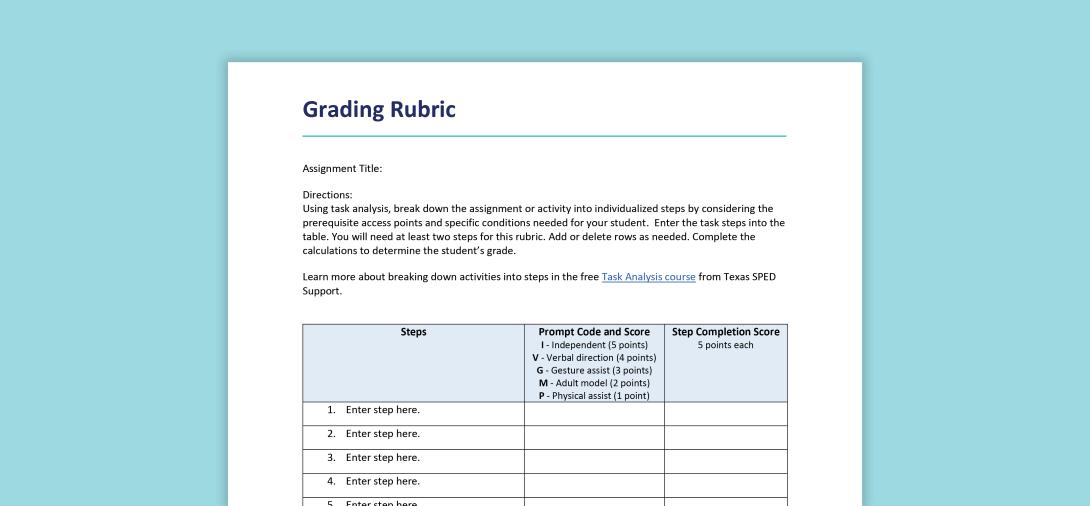Sample Grading Rubric for Students with Complex Access Needs
This grading rubric can be used as a tool to assist educators in obtaining more specific and objective activity grades for students with significant cognitive disabilities.
Educators may find this tool most useful for students who are accessing the curriculum (TEKS) at prerequisite levels and routinely participate in alternate or non-traditional methods of assessment. These students may be in the process of developing a functional and consistent mode of communication (e.g., currently non-verbal, uses very limited non-symbolic communication) and require individualized supports (e.g., modifications, task analysis, direct instruction, assistive technologies, first/then charts, tactile schedules, social narratives) and ongoing adult assistance (e.g., prompting, cueing, physical assist) to participate in on-topic academic exchanges.
Additionally, this tool can be helpful for students who are able to complete part of a task independently but require scaffolded supports for certain steps within the task.
Note: When using this tool, educators have the flexibility to identify any preplanned supports for each step within the task that do not need to be noted in the prompt code and score section. Only additional, unplanned supports the student requires while completing the task will be reflected in the prompt code and score section.
This document aligns with the Rubric of Effective Practices for Students with Significant Cognitive Disabilities Quality Indicator II: Effective Teams.
Related Content
Significant Cognitive Disabilities,
Instruction
This grading rubric scenario demonstrates how to identify prerequisite skill access points to TEKS, provide instruction that integrates individual accommodations and modifications, pre-plan individual supports, and use task analysis to determine individual student mastery of an assignment or activity
Significant Cognitive Disabilities
Explore the key themes from Quality Indicator II: Effective Teams in the Rubric of Effective Practices for Students with Significant Cognitive Disabilities.
Autism
Discover the power of task analysis to teach complex skills. Learn its benefits, steps, and find resources for successful implementation.
Significant Cognitive Disabilities,
Instruction
In this video, Ayo Jones elaborates on the concept of scaffolding by using task analysis to teach skills through forward or backward chaining.
Significant Cognitive Disabilities,
Instruction
This month’s focus is on building relationships and collecting data. The content aligns with Quality Indicator II: Effective Teams on the Rubric of Effective Practices for Students with Complex Access Needs and the Administrator Companion Document to the Rubric of Effective Practices for Students
ARD/IEP Supports,
Behavior,
Significant Cognitive Disabilities,
Autism,
Evaluation
This video shows one educator sharing how she uses a task analysis data collection form. This form is intended for use by teachers, paraprofessionals, and other service providers collecting data for student Individualized Education Program (IEP) goals and baseline data to determine a need for new/updated IEP goals or behavior intervention.







